Uncle Bill and World War II - The Battle of the Bulge
Editor's Note: When you see these three dots surrounded by a gray rectangle — 1 — you can click on it to get further information about the topic. Click a second time, and the message goes away.
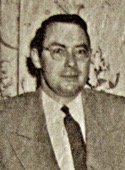
NOTE: My mother's brother, my Uncle Bill, participated in many of the major battles of the European theatre during World War II. This page and others reveal his experiences. For a full listing, see the bottom of this page. The photo at left is one of the rare photos I have of my uncle. It was taken after the war.
The Battle of the Bulge
"The Battle of the Bulge, also known as the Ardennes Counteroffensive, was a major German offensive campaign .... It was launched through the densely forested Ardennes region in Belgium and Luxembourg towards the end of the war in Europe. The offensive was intended to stop Allied use of the Belgian port of Antwerp and to split the Allied lines, allowing the Germans to encircle and destroy four Allied armies and force the Western Allies to negotiate a peace treaty in the Axis powers' favor. 2
"The Germans achieved a total surprise attack on the morning of 16 December 1944, due to a combination of Allied overconfidence, preoccupation with Allied offensive plans, and poor aerial reconnaissance due to bad weather. American forces bore the brunt of the attack and incurred their highest casualties of any operation during the war. The battle also severely depleted Germany's armored forces, and they were largely unable to replace them. German personnel and, later, Luftwaffe aircraft (in the concluding stages of the engagement) also sustained heavy losses. [^3]
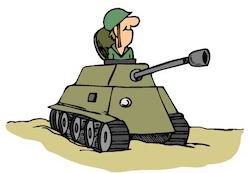
"The Germans had attacked a weakly defended section of the Allied line, taking advantage of a heavy overcast ... conditions that grounded the Allies' superior air forces. Fierce resistance on the northern shoulder of the offensive, around Elsenborn Ridge, and in the south, around Bastogne, blocked German access to key roads to the northwest and west that they counted on for success. Columns of armor and infantry that were supposed to advance along parallel routes found themselves on the same roads. 3
"This, and terrain that favored the defenders, threw the German advance behind schedule and allowed the Allies to reinforce the thinly placed troops. The farthest west the offensive reached was the village of Foy-Nôtre-Dame, south east of Dinant, being stopped by the U.S. 2nd Armored Division on 24 December 1944. Improved weather conditions from around 24 December permitted air attacks on German forces and supply lines, which sealed the failure of the offensive. 4
"On 26 December the lead element of Patton's U.S. Third Army reached Bastogne from the south, ending the siege. Although the offensive was effectively broken by 27 December, when the trapped units of 2nd Panzer Division made two break-out attempts with only partial success, the battle continued for another month before the front line was effectively restored to its position prior to the attack. In the wake of the defeat, many experienced German units were left severely depleted of men and equipment, as survivors retreated to the defenses of the Siegfried Line. 5
"The Germans' initial attack involved 410,000 men; just over 1,400 tanks, tank destroyers, and assault guns; 2,600 artillery pieces; 1,600 anti-tank guns; and over 1,000 combat aircraft, as well as large numbers of other armored fighting vehicles (AFVs).These were reinforced a couple of weeks later, bringing the offensive's total strength to around 450,000 troops, and 1,500 tanks and assault guns. Between 63,222 and 98,000 of these men were killed, missing, wounded in action, or captured. For the Americans, out of a peak of 610,000 troops, 89,000[5] became casualties out of which some 19,000 were killed. 6
"The "Bulge" was the largest and bloodiest single battle fought by the United States in World War and the third-deadliest campaign in American history."*7
Bill's Memory of that Battle
“One day…I don’t remember why…I went along on a trip to the infantry headquarters we were supporting. ... I’ll never forget the scene. Wounded were coming back from an attack. I believe the division was called the 29th but I’m not sure now, but it was the division with the patch resembling a big red bucket.They were filling that bucket full of blood in the Hurtgen Forest. Those poor men.
“I remember when the Battle of the Bulge began. We were north of this action…I suppose maybe twenty, thirty miles. Also, we were farther into Germany than where the lines were in the Ardennes Forest. In just a day or two we were ordered to the battle. All of us in Headquarters Battery collected in a small German town in a valley with a stream running through it. It was bitter cold.
“Late in the afternoon when it was apparent we would not move for several more hours most of us moved into a vacant building on a corner. A couple of guys strung up two light bulbs they ran off a captured German generator. I set up the pot bellied stove. Soon I had hot water for coffee as the C rations had packs of instant coffee, and I had a pot for making soup. Everybody threw everything they had in the soup.
“I remember Christmas Eve in the Battle of the Bulge, and then, except for one brief incident that I remember, I didn’t remember anything until the Battle of the Bulge ended. I know that my mind wipes out very unpleasant memories, just blocks them out, so it wiped out a lot of this battle.
"The one incident I remember is because it was good news for us, bad news for the Germans. I was dressing in a house…not really dressing…you never took off your clothes, put on pajamas, and went to bed. You just took your shoes and stockings off. You worked very hard to keep your feet in good shape…wash a pair of stockings every day and change those stockings each night. I don’t remember how often we worked on changing underwear but that was not as top a priority as changing stockings.
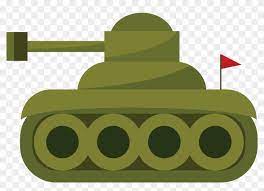
“Well, anyway, as I was pulling on my shoes the Colonel walked through the room. He was a fairly happy man. Our two forward artillery observers had watched a tank column with tanks, supply trucks, infantry trucks pull into a heavily wooded area for the night. They called down accurate fire. Our guns fired all night long. It must have been hell under those tree bursts. It is terrifying, I’m sure, under tree bursts. The shrapnel goes everywhere. Men dive under tanks…not under trucks…they can catch fire too easily. There really isn’t any safe cover.
“From reading accounts of the Battle of the Bulge in later years there is no doubt we had caught one of Pfiffer’s columns. I’m not sure I’m spelling this name right but we must have really blunted his attack with that night of shells."
Find a Place to Sleep
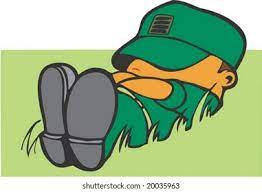
“I remember when the Battle of the Bulge ended. I was with a group of about four or five vehicles. There was the Colonel, Major Stewart, a couple of machine gun jeeps and the word came on the communications radio in the Colonel’s jeep…the battle is over, everybody stand down for the night, just stop moving, orders will come in the morning. Everybody was happy. No jeering. No hat waving. Just enormous relief.
"We all talked about going to a rest camp. Surely we would go to a rest camp. We’d never been to one. Infantry divisions go out of the line and go to rest camps and get clean clothes, beer, steaks, movies, USO shows, etc., but we had never been out of the line. We had once thought we’d have to go out of the line when the sleeves of the guns were pulled out and new ones put in, but we found that VII Corp maintenance would come up about two or three miles of us and take out one gun at a time for service, but this time we knew, we would go to a rest camp.
"About a quarter of a mile up, on a small dirty country road, was a small white house just off the edge of a forest. The colonel said, “That’s where I’m sleeping. Sgt. Hansen check it out.” I set off on the run. Two elderly frightened Belgians had guests that night.
“In the early morning hours came the most unbelievable news: back to the Hurtgen Forest. No rest camp. No clean clothes. No shower. No shave. No hot food. No clean bed. Back to the hell hole of the Hurtgen Forest.” This was a dark moment for my uncle.
More to do!
"But the war wasn’t over yet. Now we made the wild chase to encircle the German army and their industrial might in the Ruhr industrial valley. With the English in the north and the VII Corp in the south we tried to make a big circle around the Germans in this area and then squeeze in. This is risky business. You could have German defenders to the left and to the right as you were strung out in this mad chase.
"Our little group of about ten Headquarters Battery vehicles had two scary incidents in this encirclement. How it would have been much more comfortable to be traveling with the guns! One late, late afternoon….probably about dusk….we turned off a main road to find a spot for the night. We found it just as darkness set in….cold C rations, no talking, no smoking, just get out of your vehicle, find a spot to sleep on the ground, and Personnel Section on guard duty.
In combat nobody keeps guard like "on guard" would be in the States, standing or marching, upright with a gun on the shoulder. No, find your buddy for guard duty and sit back to back…best with a tree between you…as you can cover all the field and not be overly exposed, so Sgt. Veltri and I started our turn around ten o’clock…for two hours all was quiet and then a strange noise started coming from the direction away from the road.
"What was it? Tanks? No, not the noise of tanks. It seems a long way off but also quite loud if you were up close. What was it? A truck convoy? No, not that sound. Then all of a sudden it started to get louder and louder. What was it?
"All of a sudden it was very loud and then there it was….an airplane….taking off right over us. We were at the end of a still active German airfield! We saw the dual engines, the outline of the body, the winds, the tail. the fiery exhaust. Everybody was awake from the road. Then came another. Of all the places to be. Early, early next morning, quietly, so quietly, we pulled out.
"A night or two later we got a bigger fright. Late in the afternoon we pulled into a German farmyard for the night, one that was completely enclosed with a stone wall. As we pulled into the small gate, just squeezing in a couple of the big trucks, I thought how nice this would be. We’d all sleep in the farm house, on the floor, no doubt, but that’s much better than the damp ground and I started looking for the chicken coup even as we pulled in.
"For certain, we’d heat our C rations meat….SPAM….with potatoes and onions. Then….WHAM…an 88 shell right over our heads, smashing into the field beyond us. Where did that come from? Somebody in a machine gun turret on one of the big trucks yelled 'tanks' and pointed to the south. I ran to the wall and jumped up to look. There were two tanks….Tigers….maybe a mile away and headed straight for us. What a frightening sight! We were trapped.
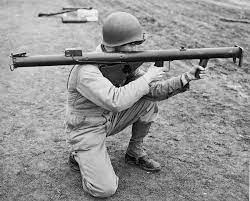
"We had one Bazooka team….and Master/sgt. Henderson. I fired. He loaded. One Bazooka team is like a fly swatter. We were both so excited we could hardly get it out of the vehicle. Everybody was yelling. Capt. Black was trying to get the vehicles turned around to make a run for it. We couldn’t fight two Tiger tanks.
"Then the man in the truck said, 'They’re turning!' I jumped up to the wall again. Sure enough, they were turning to their left. What a miracle! I have no idea why those tanks turned away from us. We were totally outmatched, but turn away they did.
"We didn’t stay in that farmhouse. We drove till we found other troops."
Here are the other battles that Bill experienced:
- Normandy June 6, 1944
- The Battle of Cherbourg June 18, 1944
- Battle of the Hedgerows and Battle of Saint Lo July 7-19, 1944
- Battle of the Falaise Pocket August 11-21, 1944
- Battle of the Hurtgen Forest September 19 - December 6, 1944
- The Fall of Aachen October 2-21, 1944
Or return to Main Page to check out other battles, other stories. (This page last edited on August 4, 2025.)
-
These three dots behave exactly like a footnote. Click on them and you will get more information about the topic. ↩︎
-
Thanks to Wikipedia for this information. ↩︎
-
Thanks to Wikipedia for this information. ↩︎
-
Thanks to Wikipedia for this information. ↩︎
-
Thanks to Wikipedia for this information. ↩︎
-
Thanks to Wikipedia for this information. ↩︎
-
Thanks to Wikipedia for this information. ↩︎